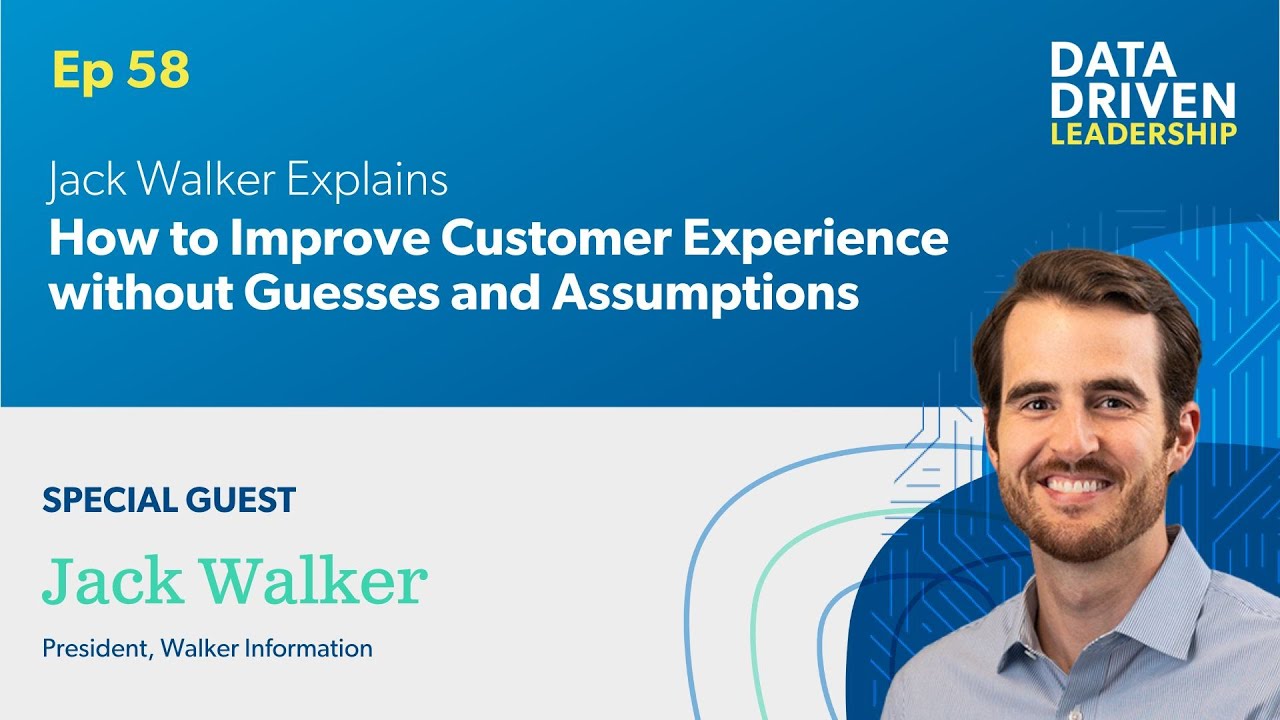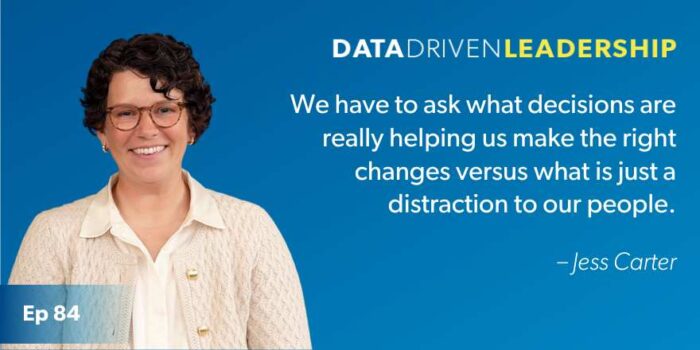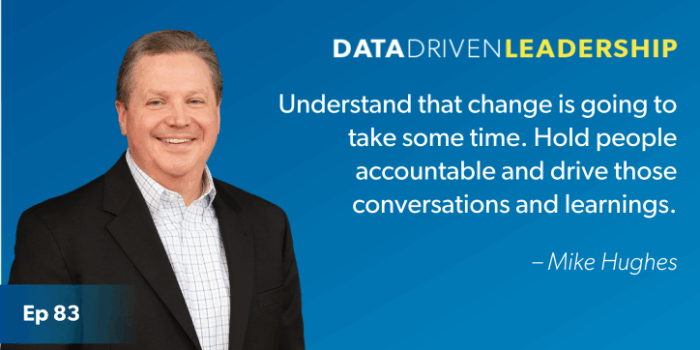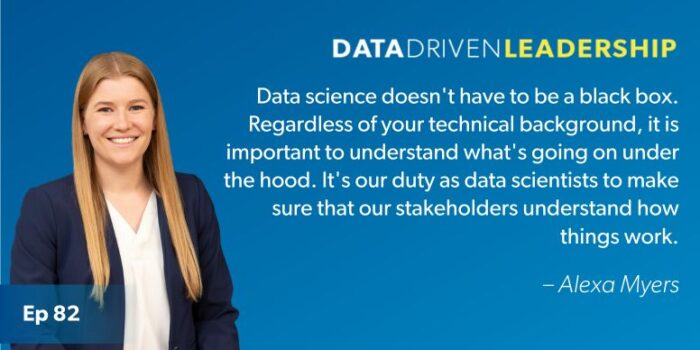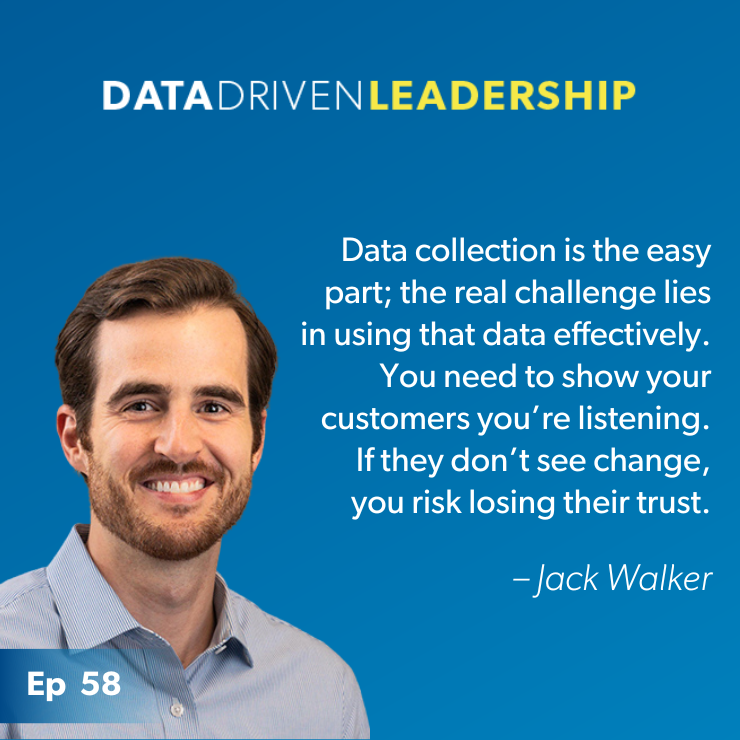
Jack Walker Explains How to Improve Customer Experience without Guesses and Assumptions
Improve customer experience and stay ahead of the competition with data analytics systems that grow with your business. Learn more about our data services.
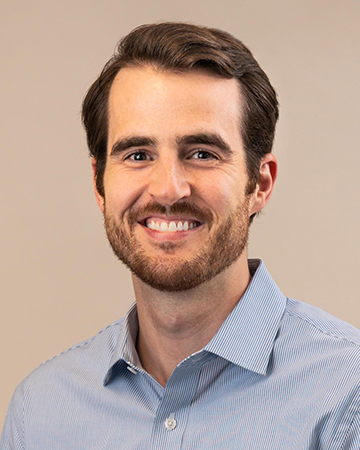
Transcript
This has been generated by AI and optimized by a human.
Show ID [00:00:04]:
The power of data is undeniable, and unharnessed, it's nothing but chaos.
The amount of data was crazy.
Can I trust it?
You will waste money.
Held together with duct tape.
Doomed to failure.
This season, we're solving problems in real time to reveal the art of the possible. Making data your ally, using it to lead with confidence and clarity, helping communities and people thrive.
This is Data-Driven Leadership, a show by Resultant.
Jess Carter [00:01:01]:
Welcome back to Data-Driven Leadership. Today we have the pleasure of speaking with Jack Walker, who's the president at Walker, an experience management services firm. Jack brings a wealth of knowledge and experience to the table and I'm particularly excited about our discussion today. We're going to dive into a critical topic which is customer experience and it's an area I'm really passionate about. It's actually one of the areas that I help lead at my company, Resultant, and it's one I think that every business leader should prioritize.
Jess Carter [00:01:01]:
In today's landscape, understanding and enhancing customer satisfaction is not just a nice-to-have, it's essential for long-term success and sustainability. Think about any of your own experiences, a vacation or calling somebody about a product you're really excited to get. Or maybe you ordered a shirt off of a company's website and you need to exchange it. If you think back, there's probably times where you remember sort of polarizing experiences. Either it went phenomenally well and they made it so easy for you to work with them, or they made it really, really difficult and it was exceptionally frustrating. This is why this matters. Walker has this rich legacy in the data-driven space and I think this is so cool. Jack's family story is so compelling.
Jess Carter [00:01:47]:
It's rooted in tradition and data collection and customer insights that dates back to the 1930s. We're about to have a conversation about how a company has evolved the last 85 years when they were collecting data before the digital era. How cool is that? This history provides this really, really unique perspective on how leveraging good data can transform businesses and create meaningful experiences for customers.
In this episode, we'll explore the evolution of customer listening from when Jack's great-grandma went door-to-door to elicit feedback, to today's world and the impact of big data on market research, and how leaders can effectively use these insights to drive their strategies. Jack will share valuable lessons learned from his family's journey and insights into how organizations can adapt to ever-evolving demands of customers. And he just seems like a really good servant leader. So I'm excited for you guys to hear from him directly.
Jess Carter [00:02:38]:
So whether you're a seasoned listener or just starting your journey in data-driven decision making, this conversation is sure to provide valuable insights and inspiration. Let's get started.
Welcome back to Data-Driven Leadership. I'm your host, Jess Carter. Today we have Jack Walker, who is the president at Walker, an experience management services firm. Let's get into it. Jack, welcome.
Jack Walker [00:03:01]:
Thanks, Jess, for having me on.
Jess Carter [00:03:03]:
Absolutely. So for those who don't know, permission to pitch, can you explain what an experience management services firm is? What does that mean?
Jack Walker [00:03:12]:
Sure. Yeah. So that's kind of a term we use in industry that I think is broader than what layman's terms. I would describe ourselves as we do customer research and consulting. That's a little bit more easy to understand, but I don't think it truly does it justice for what that is in 2024. So we do help all our customers research their customers in some way in terms of understanding what that experience is, analyzing that data, and then helping them act on it. But experience management kind of takes customer research one step forward than that. So it's not only the measurement of things, but it's also the improvement of it.
Jack Walker [00:03:51]:
And it's more than just collect the data, analyze it, and review the results and act on it in terms of just ways we do normally in our business with technology. There's so many integrations now and automations for how, as that data comes in, it does create some of these automated experiences to improve. So customer research and consulting doesn't quite do it justice, but that's kind of the easy way to understand it.
Jess Carter [00:04:17]:
Okay, that is amazing. And I'm going to jump right into one of the things I think is the most amazing about Walker, which is that your company is a family-run company. Am I using the right terms here? Family-founded, family business. Family business. I don't know why I couldn't think of that. But it's been around for how long now?
Jack Walker [00:04:35]:
85 years, actually, and it is the anniversary this month. So my great-grandmother started it in October of 1939.
Jess Carter [00:04:43]:
Wow. And when you think about that, you were doing some of this. It's not like you totally pivoted approaches. So part of the experience for me, or the intrigue is that she was doing data collection before the digital era. Like, can you talk a little bit about sort of the history of the company and how did you guys go from there to where you are today?
Jack Walker [00:05:03]:
Yeah. So it's been many different business models over 85 years, but we've always done the same thing in many ways. So we help measure the customer experience and use that data to improve a future one. So when my great-grandmother started in 1939, a lot of women didn't work back then, and it was something that she did for her family to earn a little bit of extra money on the side. And the way she accomplished the business or the value she provided to businesses was in-house interviews. She would go to people's houses, interview housewives who have a consumer product on behalf of a local grocery store, and ask them about their experience in the use of that product. And so that was kind of the earliest days of what it was. And my grandfather remembers working for my great-grandmother back then.
Jack Walker [00:05:53]:
Another job he had was to sit in the movie theater with a clicker and count how many people came into the movie theater and ultimately see their reaction as they watch the movie. So obviously very analog, not digital at all in terms of some of the early days stuff. Then you get to the fifties, sixties, and seventies. It starts to become a lot of focus groups. We had one of the first test kitchens, so a fake kitchen that we would bring to people off the street for, on behalf of consumer product companies and have them interact with this new product in a test kitchen and see how that went. Then the telephone came, and we had partners across the globe where it was just dialing out. And we were the annoying people that called during dinner to ask you about your experience with the company. Then the nineties brought the Internet, and everything shifted from call centers to web-based surveys in terms of a primary form of data collection.
Jack Walker [00:06:51]:
And now we've got systems, obviously a lot still online, but so much is now expanding with unstructured data where you don't have to necessarily solicit for feedback and still gain some insight into the customer experience. And who knows what generative AI will bring to it. So that's, I think, the next phase we'll have to explore.
Jess Carter [00:07:08]:
That is incredible. I mean, that story is unbelievable. Now, I just, I'm curious about, were you, like, going through some kind of a Walker onboarding at six years old during Thanksgiving? I mean, like, what's it like, seriously, learning about family business? Yeah.
Jack Walker [00:07:23]:
Well, people, when they ask me how long you worked at Walker, it's kind of like two different answers. So, officially, I've worked full time for ten years, but the real answer is 37 years for, you know, how long I've been on this earth. So, you know, as far as I can remember, just going into the office, being around, knowing what we did. It was my internship every summer, basically through high school and stuff like that. So I got the most grunt work things around quality assurance on testing things and stuff like that, but got a good handle on, you know, ultimately what we did. So I've seen it much longer than the ten years I've been a part of the company full time.
Jess Carter [00:08:00]:
That's amazing. Well, and one of the questions I am going to have is, it sounds like you guys have done a phenomenal job for decades, staying ahead of the technology changes and the data changes in your environment. How do you do that? Like, do you have some secret sauce?
Jack Walker [00:08:15]:
If I would pinpoint us on, I forget what it's called, but it's when the bell curve of change, like, I wouldn't say we're like the earliest innovators. We're in that early adopter group. So I think we've been successful at noticing the signs of the industry and not being, you know, the first one there, which requires tons of risk and failure. But we are fast adopters, and I think that served us well, and it served our customers well as we've helped navigate them through those various technological advancements of, there's a lot of failure for the first folks that try it, the first companies. But as we bring them along on the early adoption phase, a lot of the kinks are worked out by that point, and we help them stay ahead of the majority of the marketplace in terms of what their business is trying to do.
Jess Carter [00:09:02]:
That is so cool. As we talk about Walker, one of the things I've sort of stepped into this space, I've actually worked with your team. And so on the CX side, understanding, when we were a really small company, the way I explain it, and you can feel free to correct my language in the industry, but it was like, you know, when there were four of us, we knew the CX because we were it. We were literally it. And our founder was walking around giving us feedback on the job, showing us how to interact, showing us how to get that real, authentic feedback from our client. And so strategic planning was pretty breezy because we kind of knew what they needed, and there weren't too many voices to try and dilute into the same, you know what. Here are the summary points of what our clients want. I think as we've scaled, we've realized that that process doesn't work at scale.
Jess Carter [00:09:49]:
You can't go listen individually at scale and then make sure all those voices are heard at the right levels. And so that's where we kind of this year, took on this journey of, what should a mature CX model look like? How do we listen? And one of the things that surprised me was, you know, I'm thinking, okay, surveys, right? We've not really done those. We'll do surveys. And the team was like, yes, but everyone, including yourself, if you think about it, Jess, is inundated with surveys. We get them every day. There are too many of them to count. And so doing this thoughtfully and making sure that if you’re going to ask for that, that it is really valuable questions, that you have really clear deliverables and actions based off of, that were not wasting anyone’s time to me to jump fast forward all the way to where we are today in CX. It seems like, to your point about unstructured data, that almost seems so much more important because even when you go send out, you know, surveys, like response rates are not ideal and engagement is probably low.
Jess Carter [00:10:47]:
And that's, I don't know what percent you would say is good, but it's like, it seems like even that big initiative and effort is like if you get some feedback, it's kind of a win and you use what you can. Am I making any sense?
Jack Walker [00:11:00]:
Yeah, absolutely. It's a challenge in the industry, for sure. I actually have a hot take on that a little bit. So a lot of people talk about, you know, the survey might be dead. And I couldn't disagree more. I think it absolutely is harder and harder to receive feedback because of how inundated we are with being solicited for feedback. But when you actually do get that data, the value of it is so much higher than other data that you may have on that customer. If a customer actually gives you the time to provide their feedback in a structured way, whether it's a survey or you calling them on the phone, like, the value of that data is just exponentially greater than some operational data piece that you might have on a customer.
Jack Walker [00:11:44]:
So I think it's kind of reframing how we think about it. And there's a time and place for surveys. It's not always the perfect application across any type of customer research and measurement you're trying to do. But I'm still a believer that there always will be a time and place for soliciting feedback from customers because straight from the horse's mouth is the best way to understand what customers want. And we're all in business for our customers.
Jess Carter [00:12:09]:
If I can be so vulnerable. I think one of the things that got hard as we were scaling without the kind of support that you guys provide and now did provide to us, before that, it kind of turned into, we were trying to scale, we were trying to listen effectively, but it almost turned into it was sort of like we were all just talking to each other about what we thought the client wanted or what we thought the client we were. And no matter what we did, we were representing it through our lens. And to your point, it has been so neat to just be like, shh, let's just listen. Let's actually listen. What did they really say? What are their real words? I think I agree with you. I think that there's real value in saying everyone's adding their own color. So if you don't get it from the horse's mouth, you are at risk of adapting to feedback that isn't particularly, you know, on point in a meaningful way.
Jack Walker [00:12:57]:
Yeah, I think that's a, that's a real risk. I mean, oftentimes we are in the business with our customers where we do have a good sense of what the experience is. But so oftentimes the work we do with clients is validating in many ways to their hypotheses. But there's always some surprises that come out of the work. I think what the customer voice gives you is, you know, ultimately, they don't care how you're structured internally, whereas how you're structured internally creates inefficient and poor customer experiences. So if the billing department doesn't talk to the operations department, sure, that's just how you have to structure the business. But the customer doesn't care. They want to just make sure that the billing process is streamlined and easy.
Jack Walker [00:13:37]:
So maybe you get some raw, blunt feedback there that ultimately makes you have some conversations internally about how we're structured and ultimately how we've got to work together to make this better for our clients, because it's a pain point.
Jess Carter [00:13:49]:
Yeah. The other thing that's been really valuable for us has been, to your point, it's one thing to do the surveys, but to do them well and then to know what to do with the feedback afterwards, it's tricky. We've used this phrase, this listening architecture, this concept of what happens when a client isn't happy, because especially in consulting… so, I'm mostly talking about our experience, which is in professional services. But I realize you guys do surveys for direct-to-consumer, et cetera. Right? So in the professional consulting world, you don't want unhappy clients. And so we had to really focus on teaching our team. How do you receive negative feedback?
Jess Carter [00:14:30]:
It’s not bad to receive negative feedback, that's actually still good. It means they're still engaged. But how do you appropriately respond and teach a bunch of consultants how to take it on the chin and use it as a way to engage meaningfully and talk to their client about what they really think. Those things are all tricky. I get why you guys do both, like the implementation and support of some of these programs and the consulting side of, okay, now what? Right? I imagine you have similar things showing up, but I do beg to your point. Everybody's surprised about something, and so you kind of never know what's coming out of left field to help a client with. Is that fair?
Jack Walker [00:15:08]:
Absolutely. I mean, data collection is really the easy part. Anybody can do that. Where customer experience programs succeed or fail ultimately, is how you action off the data. You do actually use the information for the time and trust that your clients provided for you, no matter the medium. And they know that they've been heard and they're followed up in the appropriate way. And I think it's great how you said it. Like, they're engaged, they're giving you that feedback.
Jack Walker [00:15:34]:
If they were totally done, they wouldn't have even bothered to share that feedback with you. So it's still an invitation. And there's plenty of times where when you mess up a little bit, I mean, you can increase trust after a poor situation. And customer experience is a perfect scenario for that, especially when you get them to engage.
Jess Carter [00:15:53]:
Yeah, that surprised me too. I think that was something we talked about where it's like, hey, it turns out if you actually listen and gauge and can change behavior, you can actually increase trust or loyalty, commiserate in a substantial way, of course. Right? If you think about that in a relationship, like, of course that works. But applying that to work or applying that to a working engagement or a client engagement, it's just so silly to be like, of course that works. But it's like you need help having that light bulb moment. Right? Just makes me laugh.
Jack Walker [00:16:22]:
Absolutely. It's really simple when it comes down to it.
Jess Carter [00:16:25]:
Yeah. I don't want to geek out too much because I don't want to lose people. Could you riff a little bit on, like, there's customer loyalty, there's client satisfaction. Like, there's kind of these different metrics in the industry and what does good look like and response rates. Like, do you have thoughts where you could be like, here's what I feel passionate about. Here's where it just depends.
Jack Walker [00:16:45]:
Well, here's a little secret. It doesn't really matter. Now, we do have our preference and there definitely are better metrics and, like, key focus questions than others in certain situations. That we absolutely consult our clients on. But if they're in the ballpark, again, it's all about what you do with it. The absolute worst thing to do is to ask with it and then show your customer that you don't do anything with it because they've taken the time. And if they don't see you either follow up directly or see future positive changes and you taking it seriously because you've, you've asked for that, then you're going to lose them. You're going to lose their interest, you're going to lose their engagement. We assume it's just going to be a magic bullet.
Jack Walker [00:17:26]:
If we ask our customers, then we're going to improve our customer experience. But no, the hard work starts once the information's in the door and it's a continuous cycle over years and years, especially with a relationship that lasts that long where that trust is built and it kind of becomes a flywheel where it just becomes greater and greater as the years and trust builds.
Jess Carter [00:17:47]:
Awesome. Okay. So I like that. That whatever the metrics are, the important part is actually listening. Like, we're not just doing this to check a box, you know, some things where it's like, oh, we do this thing as a business to check a box. And maybe that maybe we shouldn't, but we do like. Your point is if you're, if we're gonna have a program, the worst thing you can do is have a program to check a box.
Jack Walker [00:18:06]:
Yeah, I mean, I definitely have an opinion. So Net Promoter Score—NPS—is the, the most popular weight to have as a KPI for your metric and the experience you're trying to measure. I really don't care for it. The question is how likely are you to recommend our company to a friend or colleague? I think that's self serving. You know, I understand what we're trying to get at that way. And it ultimately it's okay because everybody's used to it. But I do think it's a self-serving question to ask your customer. And ultimately, depending on the situation, there are much better kind of KPI questions to measure the customer experience.
Jack Walker [00:18:43]:
Like really just simply overall, how was your experience here? Or, you know, we have a loyalty metric that works really well, especially in like B2B settings where it's not always just attitudinal on whether they buy or not. There's other factors at play there that our type of metric takes into account, which is really practical for B2B settings.
Jess Carter [00:19:03]:
Okay, that's cool. Yeah, I love that.
Jack Walker [00:19:07]:
So now we're going to really nerd out if we go there, so.
Jess Carter [00:19:09]:
Right. Well, and I do. I am like as you look, you know, as you look into the future, and we do talk about unstructured data and gen AI and some of that, I mean, if you had a crystal ball, what do you think is the most interesting thing to look forward to in your industry?
Jack Walker [00:19:23]:
Well, I mean, generative AI, everybody's, it's such a buzzword, and I get tired of it at times. And I think we're at, we're still on the front end of ultimately getting the value out of it, but it's going to come fast. I do think as we feed those systems, I think we have to get over this initial, like, trust and privacy fear that exists in the marketplace that I think we will break through. How is it much different than the other ways we share our data? And it ultimately comes down to the trust of the organization you're working with to utilize that data for beneficial things ultimately for our customers. But as that adoption happens and that trust happens, I think it's really exciting to see ultimately how it's going to be able to pull insights faster, obviously, from large data sources. And I think we'll get tons of predictive modeling, predictive-based analysis and action that we don't have today. So I think it'll be a fascinating ride over the next few years.
Jess Carter [00:20:17]:
I think so, too. And I couldn't help but laugh when you talked about getting sick of generative AI. If you can imagine what our producers’ inbox looks like when people are like, you should have this guest on your podcast, they can talk about, drumroll, please: generative AI! And I'm like, again? I'll talk to three people who really know what they're doing with it and why it's meaningful before the 40 who say that they do. But to your point, I do think about, the light bulb for me was beyond surveys, which I think we both agree have a really meaningful view. And getting to your analogy, you know, hearing from the horse's mouth how things are going, I think looking at all the data that we have access to as a company and understanding how we can pull out more opportunities to listen. Like, we don't have some big call center.
Jess Carter [00:21:02]:
But I think you guys have helped other clients to say, hey, there's natural language processing, like you're talking to customers all the time. How do we help leverage all the ways and places and systems where you're doing that to get more value out of customer feedback. Is that fair?
Jack Walker [00:21:16]:
Yeah, absolutely. And people do hire us for, like, one-off kind of things in terms of trying to explore some aspect of research with their customers. But, it's really what you're talking about, where it's, you know, you span and aggregate it across the organization, especially as the organization gets really big, where we provide third-party guidance and trust to get something really formal, structured, and up to speed, and then ultimately have what agreed upon within the organization as a single source of truth for the customer experience, as opposed to all these different departments doing their own thing. Ultimately, the democratization of that data and putting it in hands across the organization of this is, you know, how we're measuring, and this is the customer experience. It then allows for the right cross-functional meetings and conversations to happen, to actually go and improve it from its current state.
Jess Carter [00:22:09]:
I'm a user. I'm an end user. I mean, it was like, just the coolest thing on earth to be able to start to do our strategic planning. And people were like, well, what do the clients think? And I was like, it's in our source system. You can go look. Right?
Jack Walker [00:22:19]:
Maybe we should ask the customer here. What a crazy idea, right?
Jess Carter [00:22:24]:
Okay. I have maybe two more, I don't know, ethereal questions for you about sort of the leadership side. So one is, because in a family business, you've had leadership skill sets for generations. How? What's the secret sauce there? Like, how are you guys doing leadership development again, like, as a family? Like, what? How do you think that's worked out?
Jack Walker [00:22:47]:
Oh, gosh, I don't know. I like to think of myself as a humble guy, so I. That's a hard question to answer. I think the best training is always on-the-job training, you know, the concept of 10,000 hours to become an expert at something, seeing how my grandfather and dad carry themselves and how they lead, and then you get into specific technical or soft skill situations and see that. And I'm nowhere close to 10,000 hours that I need to help carry this thing forward. But whatever thousand hours I am into it, you know, I'm on the way there. And I think, you know, not just them, but, I mean, we have such great people here. I've only worked one other place, and I've gone to school for a master's degree.
Jack Walker [00:23:27]:
But, like, the quality of people and the competency and knowledge and skill, I, you know, I'm just surrounded by really smart people each day in our business that I know challenge me to be a better person and professional, and I think that definitely plays into it as well.
Jess Carter [00:23:40]:
Okay. That is cool. Cause I hear you. You're like, it's not just the family, it's the employees. Right. But I also think it's fair. You tell me if I'm wrong. I like your conversation earlier about there was early exposure and you were doing the grunt jobs, and there was a willingness, like, there's a servant leadership, and like, hey, walk the halls, do the day-to-day stuff.
Jess Carter [00:23:58]:
If you run a customer service center, go sit in it and take some calls every month. Like, there's a little bit of that. Is that fair?
Jack Walker [00:24:04]:
Absolutely. I mean, I've done the majority of our client-facing positions. The only one I haven't done is, like, software development, which that's never going to happen unless I go back to school and learn how to code. But we have a technology-focused role, you know, project management. We have kind of business advisors, you know, the whole gamut. And really, a lot of that is we're seeing actually kind of consolidate into an expectation that our people provide all those things, not just specialize in one, but I think doing all those, the various positions, has given me a really good understanding of our business, what works, where value comes together, where teamwork really, really kicks in and helps us do great work for our clients. So I know that that has been foundational for my career and to where I am today.
Jess Carter [00:24:52]:
That's amazing. Okay, the last question I've got to ask you, did you ever want to do something else?
Jack Walker [00:24:58]:
I mean, I wanted to be an NBA player, I think, when I was in elementary school, but like a lot of little boys, I'm sure, but I think quickly understood that that wasn't going to happen. So, no, I mean, I've always looked up to my grandfather and dad and seeing them in the business, and it's always been my plan. You know, I think it also works out that not only did, you know, to follow in their footsteps, but I really love the work we do. I mean, we're not making widgets. We are helping improve experiences around the world through the work with our clients. And it stands the test of time for 85 years, and we've changed with the times to how to be effective at that, and it's never going away. Companies will always need to understand what their customer experience is and be working on improving it. There's nobleness and pride, I think, to show up every day to do that line of work that doesn't hurt, as well, for sticking in the family business.
Jess Carter [00:25:50]:
Yeah, yeah, no, that's fair. So other than an NBA, which is, again, reasonable, I wanted to be an artist. I think at 16, I drew a picture of my dad and I included three arms. That's how not artistic I am. But, yeah, I mean, your passion comes through. Right. And I think your connection to the mission of the organization is there, too, which, again, when we talk about data-driven leadership, part of that is you can't make it up. Like, you either are passionate about what you guys are doing or you're not.
Jack Walker [00:26:14]:
Well, the purpose, I don't think I said it earlier, and, you know, it's part cheesy and we don't really use it too much externally, but we use it so much as a rally and cry internally, is that the purpose of our organization is that we believe everyone deserves an amazing experience. You can say that that's been the purpose of the company for 85 years, and it'll be the purpose for 85 years more. We choose to impact that through the work we do with our clients and we try to give them an amazing experience. But really what that purpose statement means is for our clients’ clients experience and what we can do at scale, working through all the various organizations that we do to try to impact that world and try to make as much of a hit at that chunk of a very ambitious goal of everybody deserves an amazing experience, but we're doing our best to give our best effort there.
Jess Carter [00:27:01]:
That's amazing. That's awesome. Well, before we go, is there any question I have not asked that I should?
Jack Walker [00:27:06]:
I think we covered a lot of great stuff. I've really enjoyed our conversation, Jess.
Jess Carter [00:27:10]:
Okay, good, good. All right. If people want to follow you, where can they kind of keep up with Walker and yourself?
Jack Walker [00:27:15]:
So LinkedIn. Jack Walker. There's probably a few Jack Walkers on LinkedIn, though, so you can type Jack Walker, Walker Information or Indianapolis, and that's where I'm based and you should be able to find me. But I would look forward to connecting with anybody and talking about customers. That's my favorite thing to do.
Jess Carter [00:27:31]:
Thank you. Awesome. Thank you for listening. I'm your host, Jess Carter. And don't forget to follow the Data-Driven Leadership wherever you get your podcasts rate and review, letting us know how these data topics are transforming your business. What I'm trying to say is we care about your customer experience. We can't wait for you to join us on the next episode. Thanks.
Insights delivered to your inbox


